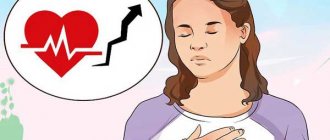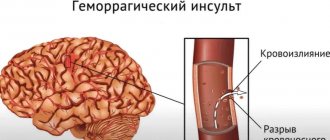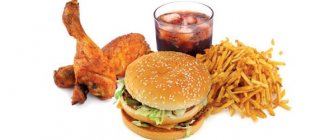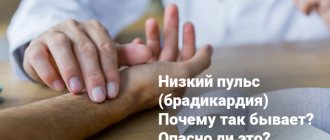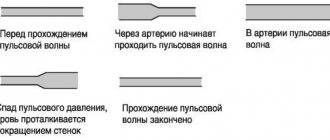What to do if your heart rate changes
What needs to be done in this case.
When the heart rate is no more than 120 beats per minute:
· Give any sedatives to calm the nervous system. For example: Glycine - 1 gram at a time (this is 10 tablets of Glycine Bio or 2 tablets of Glycine Premium).
· Give any blood-thinning drug to prevent the risk of heart attack or stroke - Aspirin, Cardiomagnyl, etc.
· If you have high blood pressure, use antispasmodics No-Spa 2 tablets at a time.
This is the safest way to alleviate the patient's condition.
Restoring the cardiovascular system after alcoholism
Restoring normal functioning of the cardiovascular system after quitting alcohol is not so quick or easy. It is possible to bring the myocardium to its original state only if a number of rules are followed. One of the main ones is a diet in which the content of fat and salt in the diet is minimized. You will need to eat more fresh fruits and vegetables. Light physical activity in the fresh air won't hurt either. Adequate sleep also helps restore the body and heart after stopping drinking alcoholic beverages.
If these measures do not have an effect, the doctor selects treatment. The standard regimen would be to take diuretics to remove excess fluid. The list of medications for therapy should be agreed upon with a cardiologist. This is the only way to improve your health. It is not possible to completely restore the cardiovascular system after alcoholism. However, stopping the destructive processes is quite possible.
When is it time to see a doctor
Tachycardia, high pulse and palpitations can lead to serious complications. Remember if:
· heartbeat more than 120 beats;
· systal pressure is increased by more than 20-30 millimeters of mercury;
· the patient is over 40 years old, the risk of blood clots, stroke, and heart attack increases significantly.
you need to consult a doctor. If the condition arose due to alcohol abuse , then it is better to seek the help of a narcologist at home or in a hospital .
The doctor will begin by recording an electrocardiogram, in order to exclude acute conditions, and will cleanse the body after alcohol.
Contraindications for use in heart disease
Ethanol contributes to the accelerated development of cardiovascular diseases. If you have any of these pathologies, you should be careful about drinking alcohol or stop drinking it altogether:
- arrhythmia - this especially applies to atrial fibrillation in paroxysmal form;
- tachycardia - ethanol has a detrimental effect on the body and causes critical harm, an attack may occur;
- angina pectoris - you need to limit alcohol consumption to 40 ml, choose only a high-quality product;
- heart disease - you can drink only a small amount of dry red wine or cognac, and be responsible for observing the dosage, which is 150 and 40 ml, respectively.
It is recommended to abstain from alcoholic beverages if you have heart failure. If you have recently undergone heart surgery, you should exclude alcohol from your diet for the entire adaptation period.
Gross mistakes
- The use of B-blockers (drugs that deliberately slow down the heartbeat) - used by doctors under the guise of infusion therapy ( drips ) where we administer electrolyte drugs - is only allowed in this case.
- Give emergency medications, for example, Nifedipine, Captopril to lower blood pressure, if the pressure has increased by no more than 20-30 mmHg. These drugs will undoubtedly lower your blood pressure, but they work for no more than 3-5 hours, and then the pressure will creep up again. Allowed if the pressure is very high for the patient, but after consulting a doctor.
Two groups of these drugs are familiar to cardiac patients and are available over the counter. Remember, these drugs will undoubtedly slow down your heart rate and lower your blood pressure - but you will get brain hypoxia, and as soon as the effect ends, all these symptoms will return and you will only make things worse.
This can cause a stroke. Therefore, until there is proper sedation and the electrolyte balance is restored, these symptoms are a protective reaction of the body.
It happens that after a binge and a course of IV drips, the heartbeat remains more than 80 beats at rest. In this case, we prescribe salt preparations Panangin, Asparkam or enhanced nutrition (dried apricots, prunes, honey).
The effect of alcohol on the human heart
Home » Medical prevention » The effect of alcohol on the human heart
Ministry of Health of the Astrakhan Region
GBUZ JSC "Center for Medical Prevention"
REMINDER FOR THE POPULATION
INFLUENCE OF ALCOHOL ON THE HUMAN HEART
Alcohol is a poison and its effect on the heart is very negative and dangerous, since the heart is the main organ through which blood circulates in our body, and when alcohol enters the blood, it is the first to take a hit. According to statistics, more than a third of all deaths from heart disease are associated with alcohol consumption.
The effect of alcohol on the heart provokes a certain number of diseases that develop as a result of its consumption. First of all, it must be emphasized that the effect of alcohol on the heart is truly poisonous. Alcohol can quickly destroy muscle cells. If complete destruction does not occur, it is important to remember that they are still partially damaged. The heart of an alcoholic is difficult to treat in the future.
Alcohol enters the blood a few minutes after it is taken, and circulates through the bloodstream for 5-7 hours. At the same time, the pulse rate increases from 70 to 100 or more beats per minute, therefore, the metabolism and nutrition of the heart muscle is disrupted in the body. Distilling blood filled with alcohol, it works in an enhanced mode, while the load on it increases several times, namely Therefore, people in a state of alcoholic intoxication experience a rapid heartbeat, which disrupts normal blood circulation and increases blood pressure, which leads to the destruction of the smallest blood vessels. The most obvious confirmation of this is the redness in the nose area of people who drink frequently and the reddened whites of the eyes, usually the morning after taking a dose of alcohol. There is a disruption of normal blood circulation, which destroys blood vessels. A person may experience oxygen starvation. The effect of alcohol on the body is destructive.
After drinking alcohol, a large amount of fat accumulates in the heart muscle, moreover, it loses its former appearance, and the heart muscle becomes flabby. This interferes with the normal functioning of the heart muscle, it cannot cope with its work, and is susceptible to the development of atherosclerosis and hypertension. Systematic intake of alcohol over the course of years leads to tachycardia, shortness of breath and pain in the heart area. 30% of sudden deaths are caused by alcohol: the heart cannot withstand the load: carbonated drinks accelerate intoxication. If a person has about 3 liters of blood in the body, then when drinking beer or low-alcohol drinks, the volume increases to 5-6 liters - with frequent drinking of alcohol, the heart is constantly in a tense state. The result is an increase in blood pressure and the development of hypertension, regardless of age, body weight and whether the person smokes or not. Atherosclerosis then develops, leading to coronary heart disease. This chain of diseases develops even when drinking only 0.5 liters of beer several times a week. Wine, vodka and other drinks are no less harmful to humans.
Alcohol consumption always and significantly increases the risk of cardiac arrhythmia and cardiomyopathy. Cardiac arrhythmia occurs as a result of alcohol poisoning or due to excessive consumption. Surely you have often heard the term “alcoholic heart”. The second name for “alcoholic heart” is cardiomyopathy. The disease can occur even if a person has started drinking alcohol recently and with relatively small doses of alcohol. In patients with cardiomyopathy, the weight and size of the heart increase (cardiomegaly). Due to the toxic effect of alcohol and its breakdown products on the myocardium, a person feels fatigue, pain in the heart, uncomfortable heartbeat (arrhythmia), swelling, coughing at night, and shortness of breath. Heart rhythm disturbances after drinking alcoholic beverages in patients who previously had cardiovascular diseases can provoke not only an exacerbation of existing diseases, but also sudden death. The more alcohol a person drinks, the higher the risk of developing heart disease and heart attacks. Alcohol in any dose has a detrimental effect on the heart.
Heart pain is closely related to alcohol consumption the day before. Heart pain often occurs the day after drinking alcohol. The next morning, after drinking, sometimes there are interruptions in the functioning of the heart, lack of air, fear of death, sweating and dizziness. Some people who drink alcohol experience shortness of breath at rest and swelling of the legs, both signs of heart failure.
If a person drinks alcohol and already has heart problems, it is important to remember that in this case the ischemia intensifies and there is a considerable probability of it turning into a heart attack. Damage to the cardiovascular system occurs in every second person who drinks alcohol.
If a person stops drinking these drinks forever, he has a chance to be cured and regain health.
BEWARE YOUR HEART!
The material was prepared by the department for the preparation and replication of medical information materials “CMP” - 2021.
Helpful information
Find out:
- Rules and features of treating blood pressure from pommel .
- diarrhea and repeated vomiting occur after alcohol abuse and how are these conditions treated?
- What does alcohol poisoning and how does delirium tremens ?
- Why does a patient experience depression after binge drinking and what to do in this case.
- How effective is succinic acid in eliminating hangover syndrome, and how can it be used independently?
Harm of alcohol to the cardiovascular system
Ethanol is a poison that affects almost all organs of a person who drinks alcohol. The heart is one of the first to suffer. Long-term alcohol abuse entails specific changes in the heart muscle. This phenomenon is called alcoholic cardiomyopathy.
When drinking alcohol, the following happens:
- blood pressure increases;
- pulse increases by about 25%;
- the load on the myocardium increases.
Blood transports oxygen and nutrients to tissues and organs more slowly. Tachycardia is typical even for healthy people. As a result, this leads to malfunctions of the myocardium. If the norm is followed, there will be no particular harm. However, if you exceed the recommended doses of alcohol, the load on the heart increases. This is especially true when combining the use of ethanol-containing drinks with smoking.
Screening for people with heart problems caused by alcohol
Patients who have cardiovascular diseases or are prone to developing them and who drink alcohol frequently and in large quantities should definitely be examined.
It is good if diagnostic procedures are suitable at the stage of preparation for coding in a narcology clinic. Then the doctor will be able to tell which option of anti-alcohol therapy is most appropriate, and the cardiologist will prescribe an effective treatment program for the identified cardiac disorders. When identifying alcoholic cardiomyopathy, the following diagnostic measures are used:
- Examination and interview of the addict. The doctor finds out how long ago and what kind of alcoholic compounds the patient has been taking, whether he was previously coded, and whether he underwent therapy for cardiac pathology.
- Study of percussion and auscultation patterns. The specialist listens to heart sounds and taps the chest area. Particular attention is paid to noise and rhythm.
- Carrying out ECG and ultrasound. These diagnostic methods are highly accurate, safe and effective. Based on their results, the cardiologist can easily make the correct diagnosis.
It is very important that a person undergoing diagnosis and planning treatment for heart disease observe the law of sobriety. It is unacceptable to go to doctors during the day and get drunk in the evening.
Case from practice
A patient came to see me who complained of rapid heartbeat after drinking alcohol for a month. This symptom had not been noted before. According to him, he drank 100 g of vodka from a friend, after which he felt sick and dizzy. There was a pressing sensation in the chest, the pulse increased to 120 beats/min. There are no changes on the ECG; a stress test revealed slight ischemia along the posterior wall of the left ventricle and an increase in pulse to 95 beats/min. Recommended: use of sedatives, reducing alcohol consumption to a minimum. After two weeks, the patient noted an improvement in his condition, and the attacks no longer recurred.
The mechanism of panic attacks
Many people wonder why panic attacks occur after drinking alcohol? This is due to the final effect of the components of alcohol. A hangover is a powerful stressor for the body. As a result, adrenaline is released . This is a hormone produced by the adrenal glands. With its excess, tachycardia, hypertension begins, breathing quickens and an inexplicable feeling of fear appears.
As the concentration of adrenaline increases, the oxygen content in the blood also increases. Blood vessels constrict, which only increases panic. The person feels empty and lost. Sometimes aggression appears. Symptoms get progressively worse. The duration of attacks varies: from 15-20 minutes to 1-1.5 hours. The danger is that they are repeated many times. At such moments, a person urgently needs help.
My heart beats fast when I'm hungover, what should I do?
If, against the background of a hangover, the pulse has sharply increased, and the level of cardiac and renal pressure has also increased, first of all it is necessary to take a drug from the group of sedatives - this can be Valocordin or Validol (the first will be preferable). Yes, even if these are not the strongest remedies that exist today, they will help relieve nervous tension, which activates the sympathoadrenal system and forms a vicious circle.
The next step is to take Bisoprolol or Amlodipine (or better yet, Nifedipine). These medications are great at helping normalize your heart rate, but they will only be safe if you use one of them.
We should not forget about simple remedies. For example, drinking plenty of fluids helps to carry out the detoxification function. Of the hot drinks, green tea is preferable, the effect of which can relieve intoxication. If you add mint and lemon to this drink, it will quickly relieve attacks of nausea and replenish vitamin C reserves, which are vital for the body during a hangover.
The best way to recover from a hangover
Detoxification with the participation of a drug addiction specialist will help you quickly get rid of hangover symptoms. The specialist determines the current drug and selects the dosage based on the patient’s medical history.
Home detoxification involves:
- Use of droppers (saline solutions, hepatoprotectors, mineral complexes, etc.);
- Use of medications (sorbents, antispasmodics, antihypertensive drugs, etc.);
- Administration of injections as prescribed by a doctor.
Inpatient conditions provide a greater choice of detoxification methods (hardware methods of UBOR, ozone therapy, etc.).
Article prepared by an expert
Terekhova Anna Vladimirovna
psychologist-consultant on socio-psychological work with addicted clients and their families. More than 9 years of experience.
Similar articles:
Phenibut addiction
How can you identify a drug addict by appearance?
What is drug intoxication?
Nasvay: the effect of the drug, types and consequences of taking it
Sleeping pill addiction
4 comments on “Hangover: the most effective remedies”
- Vasya:
August 8, 2021 at 15:25
Hello colleagues. Nothing helps, I’ll die soon, what should I do??
Answer
- oksana:
August 10, 2021 at 03:27 pm
Hello. You can contact our center for a free consultation by phone. We have both paid and free treatment programs.
Answer
- Konstantin:
August 8, 2021 at 03:34 pm
Hello colleagues! Based on the information presented above, you claim that you can cure my alcoholism or hangover due to alcoholism. From many years of experience, I can say that nothing helps. I would like to clarify whether this text, written by a specialist, is true? I expect a response as soon as possible. Thank you! (c) Konstantin
Answer
- oksana:
August 9, 2021 at 01:21 pm
Hello, Konstantin! You can contact our center for a free consultation by phone, 8 495 127 73 03. You will be given the necessary recommendations and a free treatment program will be selected, which is individual for each case. We wish you good health
Answer
Hangover treatment
Only a specialist can provide a quick remedy for a hangover. Home methods are popular due to their wide availability, but the most effective remedies are provided only by a narcologist.
How to get rid of signs at home
You can get rid of painful symptoms in the morning by drinking plenty of fluids and taking medications aimed at fighting a hangover: Antipohmelin, Limontar, Alka-Seltzer, Zorex, etc. Taking medications can be combined with sorbents.
What will help with a hangover quickly?
You can relieve a hangover in a short time only with the help of a specialist. If a person is in a hurry to an important conference, work, study, etc., it is advisable to call a narcologist at home. Putting on an IV, taking specialized medications and receiving the most important recommendations will help you quickly “get back on your feet” after a stormy feast.
How to relieve the condition without pills
You can get rid of a hangover without the help of medications. Folk remedies are available to almost every person.
Home remedies for hangovers aim to speed up the body's cleansing of toxins. To combat dehydration, it is advisable to drink mineral waters, for example “Essentuki”. The use of medicinal mineral water and normalization of water balance has the following effects on the body:
- The level of hydrochloric acid in the stomach decreases;
- Peristalsis is normalized;
- The volume of circulating blood is replenished;
- Tissue swelling is relieved;
- Mineral reserves in the body are replenished;
- Kidney function is activated.
The use of mineral waters, Regidron and the placement of a dropper are very important for relieving the symptoms of dehydration.
Foods that will help you recover from a hangover
You can reduce the intensity of a hangover by taking natural products. Some of these remedies can be found in every person’s home, so these recipes are widely available.
To combat a hangover, use the following products:
- Decoctions of mint, lemon balm, motherwort and chamomile have a beneficial effect on the body and accelerate the elimination of toxins;
- Chicken broth, eggs and boiled fish help fight a mild hangover. Protein and vitamins help the liver recover;
- Tomato juice is involved in restoring the water-salt balance. It is better to use natural tomato juice;
- Compotes and smoothies are vitamin “bombs” that improve the general condition of the body;
- Tea with ginger and lemon will help quickly alleviate a person’s condition: eliminate nausea, anxiety and weakness.
There is a misconception among people that coffee helps to cheer up after a stormy feast. In fact, coffee only aggravates dehydration of the body, so it is better to replace a cup of aromatic drink with a glass of plain water.
Hangover dropper at home and in the clinic
The substance administered through a dropper quickly enters the bloodstream, activates the kidneys and quickly flushes toxins from the body.
A narcologist can administer an IV in a hospital setting or at home. The specialist uses water-salt solutions, vitamin and mineral complexes, hepatoprotectors and other drugs.
How severe can alcohol poisoning be?
It all depends on the severity of the poisoning. Depending on the ethyl alcohol content, the following degrees of alcohol poisoning are differentiated:
- A mild degree that occurs when the concentration of ethanol in the blood is no more than 1 ‰ (ppm is 1 thousandth of something or 1 tenth of a percent (‰ = 1⁄1000 = 0.1% = 0.001). This degree of intoxication is accompanied by moderate disturbances of autonomic function in in the form of facial flushing, increased breathing, tachycardia, as well as fine motor disorders.These manifestations do not require special medical intervention and go away on their own after a few hours of sleep.
- The average degree is observed at an alcohol concentration of 1 to 2.5 ‰. With a hangover, nausea, vomiting, pallor or cyanosis of the skin, severe shortness of breath and tachycardia, and possible arrhythmia often develop. In this condition, urgent detoxification is required by a drug treatment team called to the home. Hospitalization for moderate alcohol poisoning is not provided.
- Severe degree - ethanol content exceeds 2.5‰, sometimes reaching very high levels requiring resuscitation measures. Accompanied by depression of consciousness, misunderstanding of speech, change in skin color, vomiting, salivation (hypersalivation) and even coma. Convulsions, epileptic seizures, respiratory and cardiovascular disorders that are life-threatening may occur.
The state of severe intoxication can only be relieved in a hospital setting.
How to get rid of tachycardia after alcohol
If tachycardia has already occurred after drinking alcohol, you should first consult a specialist. Stop drinking alcohol, free your airways and neck area from constrictive clothing.
Take a sitting or horizontal position. Try to breathe calmly, moderately deeply. Wash your face with cool water, massage your eyelids with your fingers, pressing slightly on each closed eye for 15 seconds.
Typically, people prone to tachycardia carry certain groups of drugs with them:
- Beta blockers;
- Calcium antagonists;
- Sedatives;
- ACE inhibitors.
The groups of drugs listed above slow down heart contractions, restore vascular tone, nutrition of the myocardium, have a calming effect on the nervous system, and eliminate feelings of anxiety and fear. During an attack of tachycardia, it is important to remain calm. Excessive nervous excitement increases heart contractions.
Additionally, it is recommended to use hepatotropic agents that restore liver function, damaged cells, and prevent the development of cirrhosis. But any medications must be used after prior consultation with your doctor.
Only a specialist can select the optimal dose of the drug and prescribe an exact regimen for the treatment and prevention of tachycardia.
What to do to restore heart function?
An alcohol addict is unable to correct the situation on his own. The first thing he should do is stop drinking alcohol
. If you don’t give up drinking completely, no cardioprotectors will help.
Drug course correction is effective in the early stages of alcoholic cardiomyopathy. In advanced cases, the patient has to take medications for the rest of his life. It is also possible that surgical intervention will be required.
The basis of therapy for cardiac pathology is:
Healthy lifestyle.
It involves giving up alcoholic drinks
textiles, cigarettes, narcotic compounds. The patient should take walks, perform physical therapy daily, and adhere to a therapeutic diet. It is important that the foods you eat contain large amounts of protein. But it is recommended to avoid spicy, fatty, salty and smoked foods. It is better for the patient to eat five times a day in small portions. The last meal should be no later than three hours before going to bed. It is also very important to maintain proper drinking regime. The optimal amount of fluid for an adult is about one and a half liters.
- Drug therapy.
For cardiomyopathy caused by chronic alcoholism, it is necessary to use medications of several pharmacological groups. For high blood pressure, doctors use antihypertensive drugs, for heart rhythm disturbances - antiarrhythmics, for swelling of the extremities - diuretics, for high cholesterol levels in the blood - statins. In difficult clinical situations, cardiac glycosides come to the rescue. They prevent attacks of tachyarrhythmia. If the patient has a tendency to form blood clots, antiplatelet agents are indicated. All funds are selected strictly individually. It is unacceptable to drink them without a medical prescription. - Surgical intervention.
It is carried out if drug correction has not provided positive dynamics, the disease is rapidly progressing, and the patient’s life is at risk. The operation is very difficult. During this procedure, a heart transplant is performed. It is clear that not every patient can tolerate it. Finding a suitable donor organ also poses difficulties. Some patients simply cannot wait until surgeons find a new heart for them.
First aid
Most deaths from alcohol poisoning are associated with delayed medical care. If you suspect severe intoxication, you should urgently call a doctor.
Before his arrival:
- do not leave the person alone, even if he has fallen asleep or lost consciousness. If he starts to feel sick, he may choke on the vomit;
- It is better if the patient stays awake; you should not let him fall asleep;
- if he is vomiting but cannot get up, place him on his side to prevent him from choking;
- if there are no problems with swallowing, you can give a sorbent. This will reduce the absorption of alcohol from the stomach.
What not to do:
- give a person to drink alcohol, coffee, milk, etc.;
- send him under a cold or contrast shower or into the bath;
- try to induce vomiting, rinse the stomach (danger of internal bleeding);
- force him to walk, stand on his feet (it’s better to sit him down or lay him down comfortably).
In cases of alcohol poisoning, people most often die due to breathing problems. It is associated with the accumulation of vomit in the oral cavity and trachea. If a person is not breathing, is wheezing, or wheezing, the upper respiratory tract needs to be cleared. To do this, place him on his side, and remove the vomit with his fingers without pushing it deeper. If the victim is unconscious, he should lie so that the tongue does not fall into the larynx.
Services of our clinic
Detoxification of the body
Detoxification is a process that goes through the human body, eliminating traces of alcohol or drugs.
Alcoholism coding
Effective coding for alcoholism, which will help a person return to a healthy and fulfilling lifestyle
Treatment of alcoholism
High-quality drug addiction treatment in Moscow and the Moscow region at a low price, individual therapy
Addiction rehabilitation
A powerful set of measures leading to complete relief from any addiction, working with the patient in 12 directions
Typical manifestations
Tachycardia after alcohol has the following symptoms:
- pulse increases to 110 or more;
- there is chest pain and severe weakness;
- the functioning of the conduction system is disrupted (sinus, atrial, ventricular tachycardia, atrial fibrillation or extrasystolic arrhythmia appears).
Patients complain of a feeling of strong heartbeat or “interruptions,” darkening in the eyes, dizziness, and shortness of breath. When ventricular tachycardia develops, a burning sensation in the chest, fear of death, and paleness of the skin appear. This condition requires immediate hospitalization to urgently restore rhythm.
Alcohol and panic attacks
Ethyl alcohol has antidepressant properties. However, during the breakdown process, ethanol quickly turns into a dangerous substance that causes mental disorders. Therefore, panic attacks and alcohol have a direct connection.
Alcohol works according to this principle:
- The body produces the hormone of joy (dopamine). Alcohol blocks the work of its antagonists. The concentration of neurotransmitters increases. At the beginning of the feast, people experience euphoria, their rises , and their mood improves.
- Then an internal conflict begins in the body. At the subconscious level, a defense mechanism is triggered. Duality of desires arises. On the one hand, a person strives to stop drinking alcohol, on the other, he strives to prolong pleasant moments.
- The subconscious sends very contradictory and alarming signals to the body. One of the ways such signals manifest themselves is through panic attacks.
Expert advice
To prevent heart rhythm disturbances after drinking alcohol, I recommend:
- do not combine drinking alcohol and physical activity;
- do not drink on an empty stomach;
- know your norm so that there is no intoxication;
- if you have diseases of the heart, intestines, stomach, vascular system and metabolic disorders, avoid “strong drinks”;
- listen to the body's reactions.
If there is an increase in blood pressure or pain in the heart, you should not drink during the acute period. It is not necessary to completely eliminate alcohol; the most important thing is not to abuse it, choose only high-quality drinks. It is also important to consult with your doctor about the possibility of combining them with medications. Many drugs in combination with alcohol can cause poisoning or an unpredictable reaction.
When to call an ambulance
Signs and symptoms for which you need to call an ambulance:
- severe headaches, which are accompanied by frequent vomiting and nausea;
- attacks of shortness of breath;
- speech problems;
- dizziness, progressive weakness;
- weakness in the leg and arm on one side, distorted facial features.
We do not recommend self-medication, as this can only aggravate the situation and lead to unforeseen consequences.
But you can temporarily ease your health until the ambulance arrives in the following way:
- taking 2 validol tablets;
- 30 drops of motherwort, tincture of valerian, Valocardin or Barboval;
- If there are no stomach problems, take one aspirin tablet.
Usually, the heart returns to normal on its own, but with excessive drinking, the risk of developing pathologies increases. It is difficult for him to cope with large amounts of ethanol, and vascular tissue suffers. And therefore, the manifestations of reactions to binge drinking are different.


